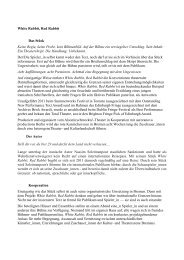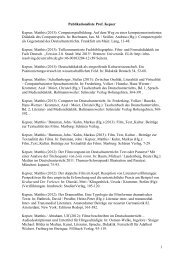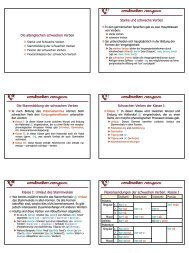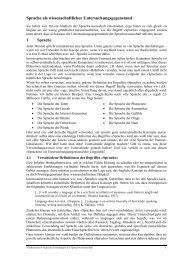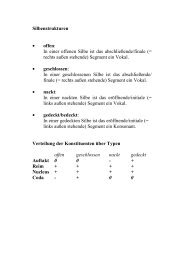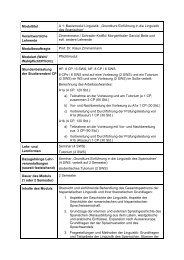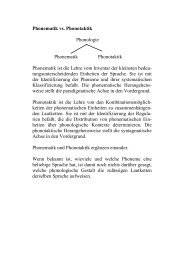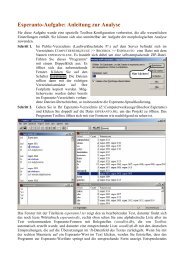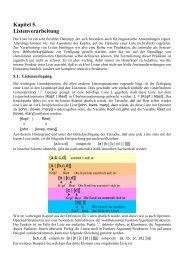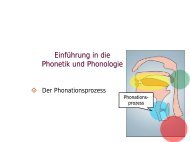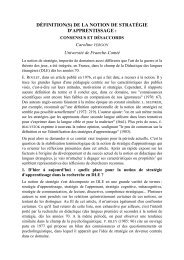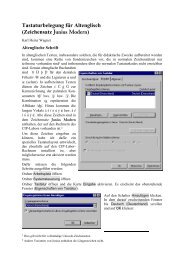Relativism and Universalism in Linguistics - Fachbereich 10 ...
Relativism and Universalism in Linguistics - Fachbereich 10 ...
Relativism and Universalism in Linguistics - Fachbereich 10 ...
Create successful ePaper yourself
Turn your PDF publications into a flip-book with our unique Google optimized e-Paper software.
Section H: Syntax 93<br />
Contrast<strong>in</strong>g f<strong>in</strong>ite, <strong>in</strong>f<strong>in</strong>itival <strong>and</strong> gerundial complements<br />
<strong>in</strong> extractions<br />
Vosberg, Uwe<br />
University of Paderborn (Germany)<br />
vosberg@zitmail.uni-paderborn.de<br />
S<strong>in</strong>ce Early Modern English, the verbalization of the English gerund has resulted <strong>in</strong> a rearrangement<br />
of the entire system of complementation (cf. Fanego 1996). A long-term <strong>and</strong><br />
general development lead<strong>in</strong>g to the replacement of to-<strong>in</strong>f<strong>in</strong>itives by -<strong>in</strong>g forms has brought<br />
about a semantic specialization which many (<strong>in</strong> particular cognitive) l<strong>in</strong>guists seemed to have<br />
regarded as clear-cut <strong>and</strong> even categorical (for a critical assessment cf. Fanego forthcom<strong>in</strong>g).<br />
However, these semantic tendencies are very often accompanied (either re<strong>in</strong>forced or<br />
weakened) by major (<strong>and</strong> potentially universal) extra-semantic factors likely to accelerate or<br />
delay the rise or fall of -<strong>in</strong>g complements after certa<strong>in</strong> verbs (such as fail or regret), adjectives<br />
(like accustomed or desirous) <strong>and</strong> verb-noun collocations (e.g. have the opportunity).<br />
Large-scale analyses of historical as well as present-day electronic corpora reveal a syntactic<br />
constra<strong>in</strong>t to the effect that the <strong>in</strong>f<strong>in</strong>itival complement option will tend to be preferred to the<br />
gerundial one <strong>in</strong> environments where a complement of the subord<strong>in</strong>ate clause is extracted (by<br />
relativization etc.) from its orig<strong>in</strong>al position <strong>and</strong> crosses clause boundaries (cf. Vosberg 2003,<br />
to appear; Hawk<strong>in</strong>s 1999 for f<strong>in</strong>ite <strong>and</strong> <strong>in</strong>f<strong>in</strong>itival complementation). As to the contrast<br />
between to-<strong>in</strong>f<strong>in</strong>itives <strong>and</strong> -<strong>in</strong>g complements, this factor must be seen aga<strong>in</strong>st the background<br />
of the complexity pr<strong>in</strong>ciple which postulates a higher degree of explicitness for grammatical<br />
structures <strong>in</strong> contexts <strong>in</strong>volv<strong>in</strong>g a substantial process<strong>in</strong>g load (cf. Rohdenburg 1996). This<br />
view, however, implies that the <strong>in</strong>f<strong>in</strong>itive is more explicit than the -<strong>in</strong>g form (<strong>in</strong> terms of<br />
sententiality).<br />
In addition to survey<strong>in</strong>g the general <strong>in</strong>fluence of this factor on the choice of sentential<br />
complement variants, this paper will give a brief description of some <strong>in</strong>-depth analyses<br />
cover<strong>in</strong>g the follow<strong>in</strong>g aspects:<br />
• Our corpus analyses have confirmed Hawk<strong>in</strong>s’ (1999) assumption that filler-gap<br />
dependencies tend to favour (short) <strong>in</strong>f<strong>in</strong>itival complements rather than (long) f<strong>in</strong>ite<br />
complement clauses.<br />
• Similarly, f<strong>in</strong>ite complement clauses explicitly marked as such by the complementizer<br />
that are apparently less acceptable <strong>in</strong> extraction contexts than those lack<strong>in</strong>g the<br />
subord<strong>in</strong>ator.<br />
• It is suggested that (more explicit complements as provided by) gerundial constructions<br />
<strong>in</strong>troduced by a preposition are more likely to be accepted by (the cognitively<br />
more dem<strong>and</strong><strong>in</strong>g) extraction contexts than directly l<strong>in</strong>ked -<strong>in</strong>g forms.<br />
• Contrast<strong>in</strong>g simple gerundial complement structures (-<strong>in</strong>g) of the verb remember <strong>and</strong><br />
their (semantically equivalent though less common) perfective counterparts (hav<strong>in</strong>g<br />
-ed), we f<strong>in</strong>d that extraction contexts are more hospitable to the (more explicit)<br />
periphrastic constructions than to the simple ones.<br />
• The tendency to use <strong>in</strong>f<strong>in</strong>itival complements rather than gerunds <strong>in</strong> extractions is<br />
found to vary accord<strong>in</strong>g to the degree of complexity <strong>in</strong>volved <strong>in</strong> different types of<br />
extraction (relativization, comparativization, <strong>in</strong>terrogation, topicalization etc.).<br />
• With<strong>in</strong> the scope of complement verbs <strong>in</strong> extraction contexts additional complexity<br />
factors such as an <strong>in</strong>creased number of syllables or a lower frequency (of usage)<br />
further <strong>in</strong>crease the acceptability of the <strong>in</strong>f<strong>in</strong>itival construction.<br />
• Occasionally, different stylistic varieties are associated with different rates of change<br />
<strong>in</strong> extraction contexts.



